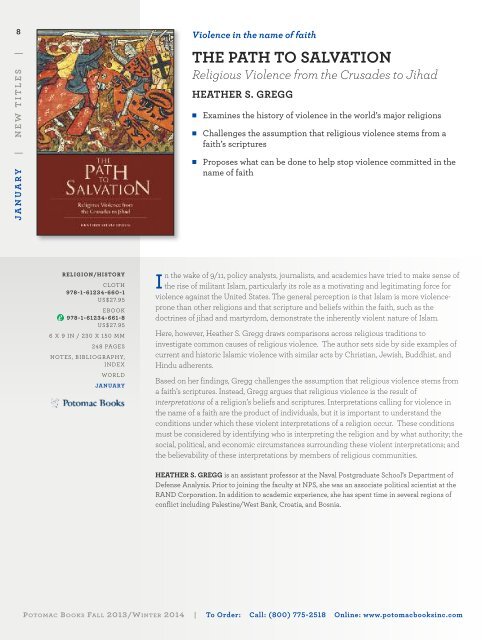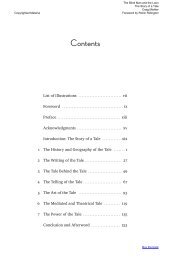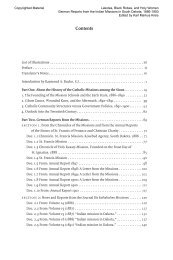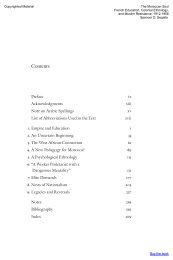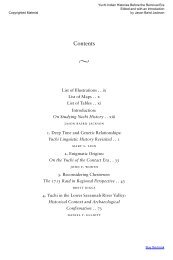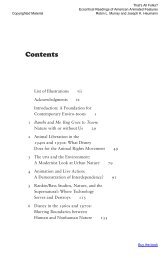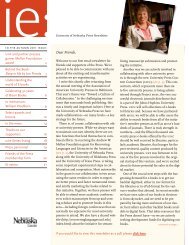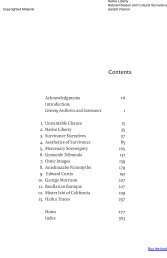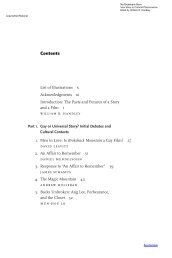Order Form Potomac Books Fall 2013/Winter 2014 - University of ...
Order Form Potomac Books Fall 2013/Winter 2014 - University of ...
Order Form Potomac Books Fall 2013/Winter 2014 - University of ...
You also want an ePaper? Increase the reach of your titles
YUMPU automatically turns print PDFs into web optimized ePapers that Google loves.
8<br />
J A N U A R Y | N E W T I T L E S |<br />
Violence in the name <strong>of</strong> faith<br />
THE PATH TO SALVATION<br />
Religious Violence from the Crusades to Jihad<br />
HEATHER S. GREGG<br />
■<br />
■<br />
■<br />
Examines the history <strong>of</strong> violence in the world’s major religions<br />
Challenges the assumption that religious violence stems from a<br />
faith’s scriptures<br />
Proposes what can be done to help stop violence committed in the<br />
name <strong>of</strong> faith<br />
RELIGION/HISTORY<br />
CLOTH<br />
978-1-61234-660-1<br />
US$27.95<br />
EBOOK<br />
978-1-61234-661-8<br />
US$27.95<br />
6 X 9 IN / 230 X 150 MM<br />
248 PAGES<br />
NOTES, BIBLIOGRAPHY,<br />
INDEX<br />
WORLD<br />
JANUARY<br />
In the wake <strong>of</strong> 9/11, policy analysts, journalists, and academics have tried to make sense <strong>of</strong><br />
the rise <strong>of</strong> militant Islam, particularly its role as a motivating and legitimating force for<br />
violence against the United States. The general perception is that Islam is more violenceprone<br />
than other religions and that scripture and beliefs within the faith, such as the<br />
doctrines <strong>of</strong> jihad and martyrdom, demonstrate the inherently violent nature <strong>of</strong> Islam.<br />
Here, however, Heather S. Gregg draws comparisons across religious traditions to<br />
investigate common causes <strong>of</strong> religious violence. The author sets side by side examples <strong>of</strong><br />
current and historic Islamic violence with similar acts by Christian, Jewish, Buddhist, and<br />
Hindu adherents.<br />
Based on her findings, Gregg challenges the assumption that religious violence stems from<br />
a faith’s scriptures. Instead, Gregg argues that religious violence is the result <strong>of</strong><br />
interpretations <strong>of</strong> a religion’s beliefs and scriptures. Interpretations calling for violence in<br />
the name <strong>of</strong> a faith are the product <strong>of</strong> individuals, but it is important to understand the<br />
conditions under which these violent interpretations <strong>of</strong> a religion occur. These conditions<br />
must be considered by identifying who is interpreting the religion and by what authority; the<br />
social, political, and economic circumstances surrounding these violent interpretations; and<br />
the believability <strong>of</strong> these interpretations by members <strong>of</strong> religious communities.<br />
HEATHER S. GREGG is an assistant pr<strong>of</strong>essor at the Naval Postgraduate School’s Department <strong>of</strong><br />
Defense Analysis. Prior to joining the faculty at NPS, she was an associate political scientist at the<br />
RAND Corporation. In addition to academic experience, she has spent time in several regions <strong>of</strong><br />
conflict including Palestine/West Bank, Croatia, and Bosnia.<br />
POTOMAC BOOKS FALL <strong>2013</strong>/WINTER <strong>2014</strong> | To <strong>Order</strong>: Call: (800) 775-2518 Online: www.potomacbooksinc.com


